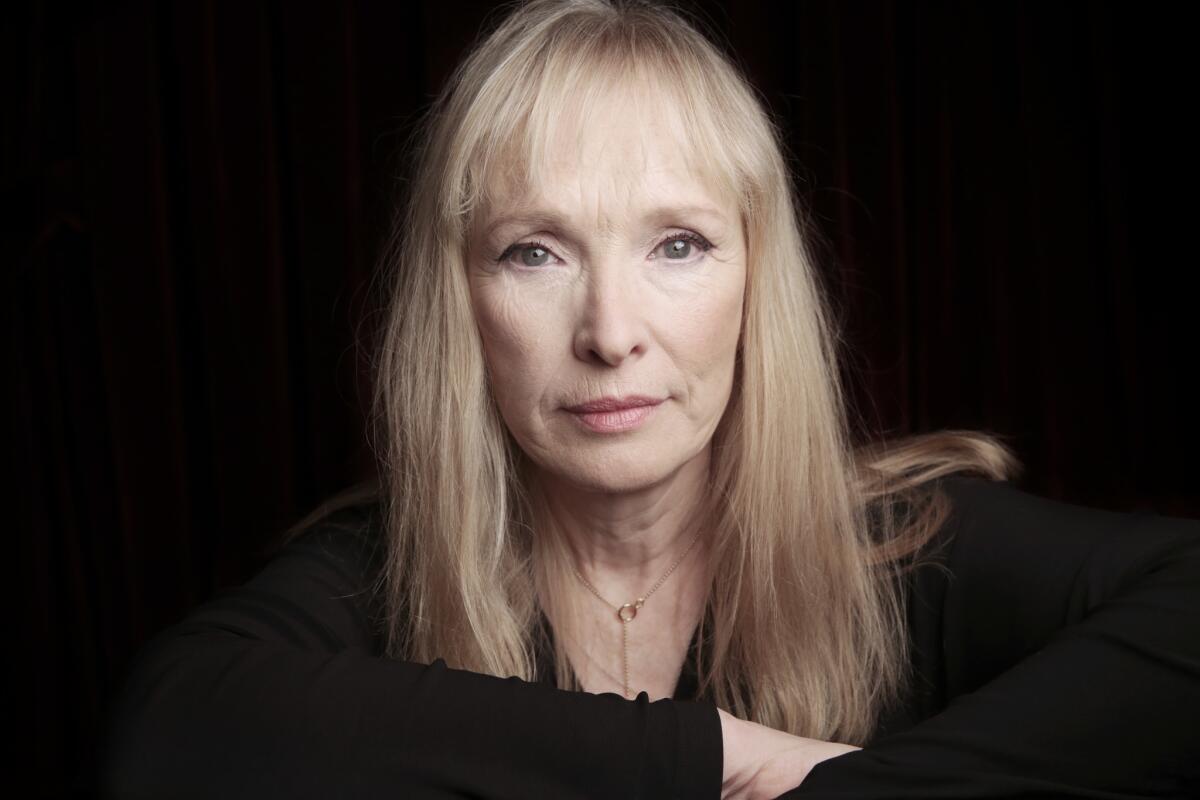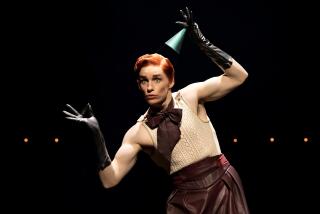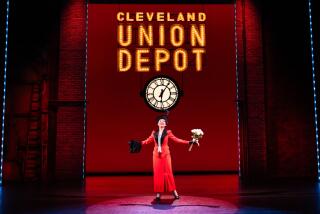Lindsay Duncan finds her footing in ‘A Delicate Balance’

Elaine Stritch didn’t originate the role of Claire, the alcoholic loose cannon of Edward Albee’s Pulitzer Prize-winning 1966 drama “A Delicate Balance.” But she did put her corrosively funny stamp on the part in a 1996 Lincoln Center Theatre production, a potent highball of a performance that paved the way for her late-career glory.
Stritch’s portrayal has been on the minds of theater connoisseurs of late both because of her death earlier this year and because of a new Broadway revival that opens Nov. 20 at the John Golden Theatre starring Glenn Close and John Lithgow.
Close, a three-time Tony winner, is playing Agnes, Claire’s sister. Claire is the plum role, but Close told the New York Times that she didn’t want to compete with the memory of Stritch’s brilliance.
So who’s the actress brave enough to tackle the character many now associate with that inimitable Broadway rasp? Lindsay Duncan, the much-laureled British stage actress who has a small but consequential part in the film “Birdman or (The Unexpected Virtue of Ignorance)” playing a wrathful New York Times theater critic whose every utterance oozes strychnine.
Director Pam MacKinnon — who won a Tony for her staging of Albee’s “Who’s Afraid of Virginia Woolf?” — couldn’t have found a better way out of this casting conundrum.
While on a dinner break from rehearsals last month, Duncan greeted me in her dressing room while still partly in costume. An angular Scottish beauty of a certain age, she was in good humor despite an exhausting day of technical rehearsals and yet another visitor bringing up Stritch’s tour de force, which probably to her benefit she didn’t see.
“People haven’t stopped talking about it because it was obviously one of those wow performances,” she said. “I can’t be anxious because we are so different. Our Claires are going to be as different as possible within the brief Albee has given us to play. And I wouldn’t begrudge Elaine Stritch anything. She’s one of your legends, and as far as I’m concerned, she can have it all. Thankfully, I can only do the Claire that I can do.”
That should more than suffice. Since Duncan made her sensational Broadway debut as the scheming La Marquise de Merteuil in the Royal Shakespeare Company’s 1987 production of “Les Liaisons Dangereuses,” her forays onto the New York stage have been something of an event for seasoned theatergoers unable to resist another encounter with this theatrical thoroughbred, blessed with a voice that can go from golden to guttural in less than a second.
Choosing a favorite performance would be as daunting a proposition as having the manager of Tiffany & Co. open the jewelry case and offer a free pick of the glittering merchandise. Duncan, whose astringent performance in the film “Le Week-End” opposite Jim Broadbent was one of last year’s under-sung marvels, is high on my short list of the greatest English-speaking actresses working today.
A canny interpreter of Harold Pinter’s menacing enigmas, Duncan channeled the traumatic mystery of his play “Ashes to Ashes” with harrowing intensity. Charged with seductive fury, her Tony-winning turn in Noël Coward’s “Private Lives” revealed unexpected depths in this staple of boulevard comedy. Those of us who saw her in Henrik Ibsen’s “John Gabriel Borkman” with Fiona Shaw and her frequent stage partner Alan Rickman can stand to be picky about future revivals, knowing that we saw the play done with crackling conviction by unsurpassed experts.
With such a resume you might think Duncan would be a passionate partisan for the stage. But just as her acting is distinguished by its bracing candor, so too is her offstage manner.
“For actors, the theater does give us opportunity we don’t always have in other mediums,” she said. “I think it’s a great way to begin. It’s not what everyone wants to do, and it’s not a great way of life, to be honest, which is why I do it less and less.”
When I asked her what she was most famous for in Britain, she looked puzzled, as though the question never occurred to her. She said that recently a security guard saw her and had trouble placing her. Finally he came up with the answer: “Rome,” the international miniseries shown here on HBO. Duncan quipped to the guard, “Yes, I had better hair then,” to which he apparently replied, “Red hair and younger, much younger.”
Duncan ended her tale with a bemused shrug that seemed to say, “So much for fame!”
Although she has excelled in the classics, it’s new writing that means the most to her. Of her British TV work, she’s especially fond of “Shooting the Past,” written by playwright Stephen Poliakoff. She was thrilled to get a second crack at the elusive “Ashes to Ashes.” And she singled out “Mouth to Mouth,” a drama written for her by her friend Kevin Elyot, and “That Face,” a play by Polly Stenham in which she played an upper-class addict (background that is coming in handy for her portrayal of Claire) as stage highlights.
Duncan trained at London’s prestigious Central School of Speech and Drama. If she betrays a streak of perfectionism, she reveals an even greater strain of British pragmatism. She is not one of those Method actors who wears her character’s nightgown to bed.
“If I had inhabited some of the characters I played, I’d probably be in jail or in an insane asylum,” she said. “I take work home in the sense that I worry so much about getting it right, but I don’t take my character home with me. My husband, Hilton McRae, is also an actor. He just did a show here in New York at La MaMa, and our life has been get up in the morning, do lines, go to the theater. I know I’m not the only one who finds that it is necessarily hard — that’s just the way it is because it’s very specific in its demands and nothing less will do, sorry.”
She added, “You always feel in the theater as if the rest of your life has stopped, so I leave big gaps in between plays.” When later I asked whether she had her next theater project lined up, she replied,” Oh God, no!”
At the moment “A Delicate Balance,” perhaps the most anticipated Broadway opening this fall, has Duncan’s complete attention, and well it should. The play has the expensive furnishings and dry-martini wit of drawing room comedy, but there’s nothing conventional about the work, which daringly marries naturalism with absurdism. In Albee’s own succinct précis, the drama “concerns a comfortable family invaded by reality long after they are capable of dealing with the invasion.”
Ambushed by existential panic, Harry and Edna (played by Bob Balaban and Clare Higgins) seek refuge at the home of their old friends Agnes and Tobias, just as their hosts’ daughter, Julia (Martha Plimpton), has returned after yet another marital fiasco. Watching from the sidelines with a gimlet eye and a brandy in hand is unmarried Claire, a character who takes it all in, the hypocrisy, the self-deception and the love that’s impossible to distinguish from enmity, and fires off apercus like a Shakespearean fool treading on perilous ground.
Has her background in Pinter prepared her for Albee, who similarly refuses to justify dramatic actions along standard realistic lines? “Not everything can be spelled out or rationalized or even named,” she said. “Having done a lot of Pinter, I am quite comfortable approaching some of the darkest things, but not in the sense that the audience can take it or leave it, because I do think our job is to make the imponderables recognizable for what they are.”
Her focus has been on mastering Albee’s naturally artificial dialogue. “The play will take us a little while before we can really cook with it because the language is difficult,” she said. “We’re all finding it challenging because these are very intelligent people for whom language is totally available. These WASPS can kill you with their language, so you really have to be on top of your game.”
For all the stylish cinematic flourishes of “Birdman,” what enticed her to play a viperish critic hellbent on repelling the Broadway incursion of a washed up Hollywood superhero franchise star was the story. ‘It’s delicious because of the writing,” she said. “This woman despises modern film culture and the counting out of weekend box-office receipts, a position I have some sympathy for.”
When I asked Duncan who her acting heroes were growing up, she voiced regret at never having seen Peggy Ashcroft onstage. As for her contemporaries, she named Julianne Moore (whose performance in “Still Alice” she found “extraordinary”) and Isabelle Huppert: “Both have been so curious and want to chase ideas in their work. If I weren’t me — and I don’t want to be anyone else — I wouldn’t mind being either of them.”
But it’s writers, she acknowledged, who have taught her how to act. “Good writing just does, and that’s why traditional training, where you do a mixture of modern and classical work, is invaluable, because even if you never utter a syllable of Shakespeare again, you will have mined language and allowed it to take you somewhere. There is a big problem with the younger generation of trying to make things sound more natural by making them more casual. There’s nothing casual about great writing.”
Duncan’s approach has made her the consummate writer’s actor. She yields to text the way a master violinist yields to a score, drawing out color that inheres in a composition but typically passes unnoticed. Her boldness intuitively matches the artist she’s serving.
Gracious as she is with her time, she doesn’t relish talking about herself.
“The bulk of my work isn’t commercial — there’s not a lot of money hanging off it — so they don’t need me to do the very scary part of publicity, which is handing over a slice of your life,” she said. “One of the greatest things of not having more of a movie career is that you get to keep your privacy. When I started there wasn’t this sense of access to show business. Acting was a mystery. I don’t think we should demystify it.”
More to Read
The biggest entertainment stories
Get our big stories about Hollywood, film, television, music, arts, culture and more right in your inbox as soon as they publish.
You may occasionally receive promotional content from the Los Angeles Times.







